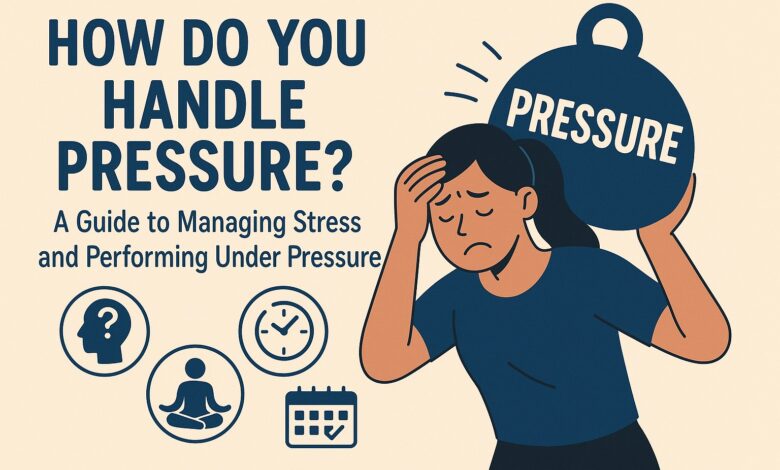How Do You Handle Pressure? A Guide to Managing Stress and Performing Under Pressure
Effective Strategies for Managing Stress and Thriving Under Pressure

Handling pressure is an essential skill in both professional and personal life. Whether you’re facing tight deadlines at work, managing difficult situations, or dealing with the demands of daily life, knowing how to handle pressure effectively can lead to better performance, enhanced mental health, and greater overall satisfaction. In this article, we’ll explore various strategies for managing pressure, discuss the importance of stress management, and offer practical tips on how to stay calm and focused under pressure.
Understanding Pressure and Stress
What is Pressure?
Pressure refers to the demands or challenges that individuals face in their personal or professional lives. It often involves time constraints, high expectations, or difficult situations that require urgent attention and decision-making. While pressure can be motivating and lead to positive outcomes, excessive or poorly managed pressure can result in stress and burnout.
The Importance of Stress Management
Stress management is the process of controlling your emotional, mental, and physical reactions to challenging situations. Effective stress management helps maintain emotional resilience, prevents burnout, and ensures that individuals can perform well even under high-pressure circumstances.
Key Strategies for Handling Pressure
1. Prioritize Tasks Effectively
Time management is crucial when handling pressure. One of the most effective strategies is to prioritize tasks based on their urgency and importance. By using tools like to-do lists or task management apps, individuals can break down complex tasks into smaller, manageable steps.
-
Task Breakdown: Start by identifying the most critical tasks and focus on completing them first.
-
Setting Realistic Goals: Make sure your goals are achievable within the available time frame.
This approach helps you maintain clarity and reduces the overwhelming feeling that often comes with pressure.
2. Practice Mindfulness and Relaxation Techniques
Mindfulness techniques, such as deep breathing exercises, progressive muscle relaxation (PMR), and mindful meditation, can significantly reduce stress levels. These relaxation techniques allow you to stay present and focused, preventing anxiety and distraction from taking over.
-
Deep Breathing Exercises: Breathing deeply and slowly can calm the nervous system and reduce physical symptoms of stress.
-
Progressive Muscle Relaxation: This technique involves tensing and then relaxing various muscle groups to alleviate stress and relax the body.
3. Develop Emotional Resilience
Emotional resilience refers to the ability to bounce back from difficult or stressful situations. Individuals with high emotional resilience are better equipped to handle setbacks, criticism, or pressure. Building emotional resilience involves focusing on self-awareness, emotional intelligence, and positive reappraisal.
-
Self-Awareness: Recognize your emotional triggers and understand how you react under pressure.
-
Positive Reappraisal: Change your perspective on challenging situations by viewing them as opportunities for growth rather than threats.
4. Delegate Tasks and Seek Support
When under pressure, it is essential to know when to delegate tasks or ask for help. Delegating responsibilities can lighten the load and allow you to focus on the most important tasks.
-
Task Delegation: Share responsibilities with colleagues or team members to reduce your workload and increase overall productivity.
-
Seeking Social Support: Reach out to friends, family, or colleagues for emotional support or advice during stressful times.
5. Build Mental Toughness
Mental toughness is the ability to stay focused and maintain a positive attitude, even when facing adversity. It involves maintaining your composure, staying calm, and not letting stress overwhelm you. Mental toughness can be developed through consistent practice and self-discipline.
-
Visualization Techniques: Visualizing successful outcomes or how you will handle stressful situations can help you remain calm and confident.
-
Cognitive Behavioral Techniques (CBT): These techniques help change negative thinking patterns and replace them with positive, constructive thoughts.
Practical Tips for Managing Pressure in the Workplace
1. Focus on Time Management
Effective time management is essential for handling pressure in the workplace. Make use of tools like the Eisenhower Matrix, which helps categorize tasks based on their urgency and importance. Prioritizing critical tasks over less important ones will reduce unnecessary stress.
2. Stay Organized and Avoid Procrastination
Being organized can significantly reduce feelings of pressure. Keeping track of deadlines, meetings, and assignments through calendars or task management software ensures that nothing is left to the last minute.
-
Avoid Procrastination: Procrastination can create unnecessary stress as deadlines approach. Start working on tasks early to avoid last-minute pressure.
3. Adapt to High-Pressure Environments
Some work environments, such as those in high-stakes industries or during critical projects, are inherently high-pressure. It’s important to develop the ability to adapt and remain calm under these circumstances.
-
Feedback Reception: Stay open to feedback, as it helps you adjust and perform better under pressure.
-
Conflict Resolution: Handling conflicts with colleagues or clients calmly and constructively can reduce pressure and prevent workplace stress.
4. Set Boundaries and Manage Expectations
Setting clear boundaries and managing expectations can prevent stress from escalating. This involves being assertive about what you can and cannot handle, ensuring that you don’t take on more than you can realistically manage.
-
Work-Life Balance: Maintaining a healthy work-life balance is critical for preventing burnout and managing pressure effectively.
Stress Management Techniques for Long-Term Success
1. Regular Physical Activity
Exercise is a natural stress reliever. Regular physical activity helps reduce stress hormones and boosts endorphins, which are chemicals in the brain that promote feelings of happiness and relaxation.
2. Maintaining Healthy Relationships
Strong relationships provide emotional support during times of stress. Surround yourself with people who encourage and support you, whether at work or in your personal life.
3. Use Relaxation Techniques Daily
Incorporating relaxation techniques into your daily routine can help you manage stress in the long term. Practice mindfulness, deep breathing, or journaling to keep stress levels under control.
Frequently Asked Questions (FAQ)
1. How can I reduce stress when facing tight deadlines?
To manage stress with tight deadlines, prioritize tasks, break them into smaller steps, and focus on one task at a time. Delegating tasks, asking for support, and using relaxation techniques can also help.
2. What are some quick techniques to calm down during stressful moments?
Deep breathing exercises, progressive muscle relaxation (PMR), and visualization techniques are quick and effective methods to calm down during stressful moments.
3. How do I handle workplace pressure without burning out?
To avoid burnout, practice time management, delegate tasks, and set realistic expectations. Maintaining a work-life balance and seeking social support is also key to managing workplace pressure.
4. What role does emotional resilience play in handling pressure?
Emotional resilience helps you recover quickly from setbacks and stress. By developing emotional intelligence and positive thinking, you can handle pressure more effectively without feeling overwhelmed.
5. How do I build mental toughness for handling pressure?
Building mental toughness involves practicing resilience, focusing on self-discipline, using visualization techniques, and applying cognitive behavioral techniques to stay calm and focused under pressure.
Conclusion
Handling pressure is a skill that can be developed with practice. By prioritizing tasks, practicing mindfulness, building emotional resilience, and using relaxation techniques, you can navigate stressful situations more effectively. Remember, managing pressure is not about avoiding stress, but learning how to respond to it in a way that enhances your performance and well-being
